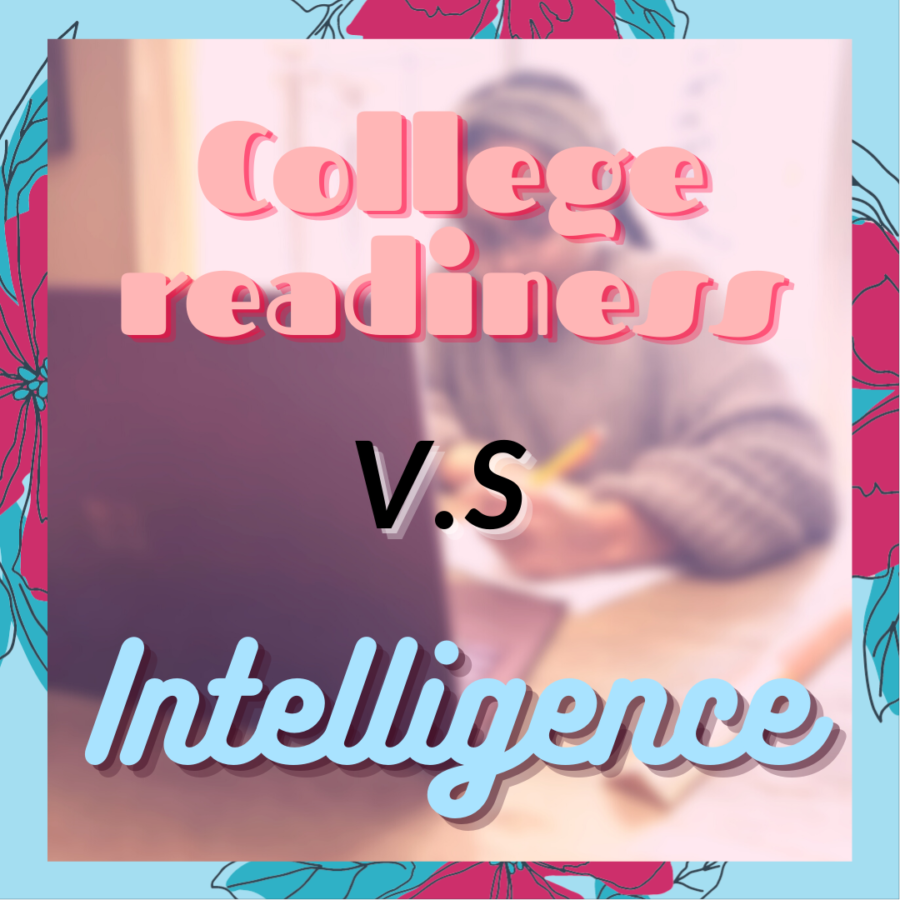The SAT is Not a Measurement of Intelligence
The SATs along with other forms of standardized tests are traditionally utilized to measure intelligence as a part of college readiness, but is intelligence so easily measured from a single test?
“I’m not getting into college!” my friend exclaimed as I saw her anxious eyes widen at the uncertainty of her future reflect off the screen during a FaceTime call. Although I tried to reassure her that she would get into college because worked hard, did extracurriculars, and was smart, she could only see her SAT score hovering above her, darkening any hope of her ambitious future.
The SAT and ACT tests are standardized tests administered by the College Board every year to test students on reading comprehension, grammar, and problem-solving.
History of the SAT
Born in 1926, the SAT was first administered to high school students and has tortured them ever since. Carl Brigham along with Robert Yerkes, Princeton psychologist, and Harvard professor respectively, worked together to create Army IQ tests to “select the most intelligent people of society,” according to PBS. Brigham then published his concerns of the quality of American education in his A Study of American Intelligence.
The president of Harvard, James Contant, first used the SAT in 1924 to help select students for scholarships as a means of making Harvard “a more egalitarian institution.” According to Prepscholar, he believed the test “…was an effective measurement of intellectual potential.” But is college readiness the same as intelligence?
These tests feel robotic sometimes, asking students to achieve the low expectation of nothing short of a perfect score; but the common misconception is that these future-determining tests also determine how smart a student is.
College Readiness
College readiness is a term used to define the skills that a student needs in order to prepare for post-secondary education. This is represented by the college admissions process where students are required to send in scores from standardized tests, a record of GPA and extracurricular activities, and a college application essay as means of revealing whether or not a student is ready for the challenges ahead.
Self-awareness, commitment, and academic readiness are three key skills colleges are looking for, according to The Edvocate. Standardized tests are designed to measure the latter. Academic readiness means quality performance. The SAT and similar standardized tests measure students’ ability to comprehend, problem solve and use proper expression.
Intelligence
Intelligence as a term and a theory have a vague application to society versus an individual. “…at its broadest, intelligence refers to the functioning of a number of related faculties and abilities that enable us to adapt and respond to environmental pressures,” as defined by Psychology Today.
In order to clear the air, let’s say the average person is born with a natural gift towards plus zero experience with comprehension, expression, and problem-solving. The latter skill is learned and applied throughout primary and secondary education, while the former is strengthened in a combination of these skills as well as personal exploration. This is intelligence. Both the natural gift and secondary skills are improved with diligence and experience.
According to Psychology Today, intelligence is not necessarily a fixed talent but can be improved in terms of memory, problem-solving, and comprehension speed. Sound oddly familiar?
While the goals of intelligence are clear, the SAT’s successful measurement of intelligence isn’t. The SAT is rather “a tool of meritocracy” in every sense of the definition: you study, memorize and spit out strategies and formulas to get the best scores so that you earn your way to college.
Although both intelligence and SAT scores can be improved, this doesn’t mean that the SAT measures intelligence, at least not completely. Psychology Today states that there are nine types of intelligence ranging from social to emotional understanding of yourself and others. Although appealing, this theory is not universally accepted. Nonetheless, the theory implies the range of intelligence on the individual scale.
Every student has a different type of intelligence that may or may not be advantageous or accurately reflected in a standardized test. In other words, the SAT measures how proficient your secondary skills are, as opposed to a reflection of one’s natural gift.
While the exact requirements vary from college to college, 95% of colleges required SAT and ACT scores from applicants prior to COVID-19, according to US News. As the pandemic, however, many colleges loosened score requirements as optional. This reasoning is probably from health concerns in terms of limiting the spread of the virus. Although it does play a role in determining college readiness, it does not reflect one’s intelligence.
This is especially evident in highly competitive colleges like the Ivies that have to search for the shiniest apple from an orchard of shiny ripe apples. There’s no guarantee that just because you have the perfect grades and SAT scores that you’re a shoo-in for a competitive college. In which case alumni interviews are conducted with applicants to focus more on the student rather than their grades and scores.
According to ThoughtCo, “Even students with a 4.0 and extremely high standardized test scores get rejected from Brown.” Earning your future isn’t easy, but it’s easier knowing they’re all just numbers.
These tests focus on measuring an individual’s proficiency in comprehension, expression, and problem-solving. These skills represent prerequisites to improving one’s natural gift. This test does not measure nor identify one’s natural affinity.
Even if you get a low score your future’s not over. You can prove to colleges that you have a certified passion for something and want to explore and refine that skill so that you could improve the world for the better.
This is your future, so don’t be discouraged after confronting a low score, but instead chase after improvement. After all, it’s yours and no one else’s.



